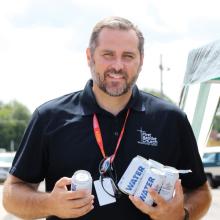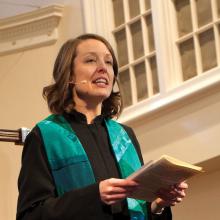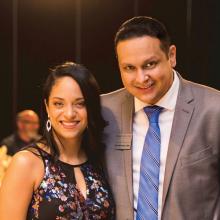Q&As With Baptist Leaders
Meet Dr. Jason Burden (MDiv ’05, DMin ’11), President of Texas Baptists (2020-present) and Pastor of First Baptist Church Nederland, Texas, Dr. Carol McEntyre (MDiv/MSW ’03), Moderator for the Cooperative Baptist Fellowship (2020-2021) and Pastor of First Baptist Church Columbia, Missouri, and Dr. Tony Miranda (MDiv ’15, DMin ’18), President of the Hispanic Baptist Convention of Texas (2019-present), Pastor of Primera Iglesia Bautista in Robstown, Texas, and Adjunct Professor at various Christian universities.
Over the last year, these three Truett Seminary graduates have served people with faithful and faith-filled commitment, even when confronted with the unexpected challenges of a pandemic. In this Q&A, they share about their time in seminary as well as their work and ministry as leaders in Baptist life.
Q: What originally brought you to Truett Seminary as a student?
Burden: Before I surrendered to the ministry, I didn’t know much about Baptist life, but I knew a pastor named Bill Schibler. Growing up in Central Texas, he was just an icon of what it meant to be a godly man and a godly person. I knew that he was a Baylor graduate, and I just assumed that all good Baptists came through Waco at some point. So back in the late ’90s, I went to Baylor’s Seminary at FBC Waco and told them I wanted to sign up. They talked with me about my calling and my Christian experience, and just from those first conversations, I felt that this was a place I needed to be. After receiving my MDiv, there was no debating where I would do my Doctor of Ministry work. I loved my professors and my experience at Truett so much that I was going to make every effort to do my DMin at Truett as soon as I could.
McEntyre: Two main things brought me to Truett. One was Truett’s commitment to women in ministry and an approach to learning that helped students learn to be critical thinkers. Second, I came to Truett because I wanted to do the Master of Divinity/Master of Social Work dual degree program. Initially when I came, I actually thought that I would be the executive director of a faith-based nonprofit or something like that, which is why I wanted to do the dual degree. I wanted to have the theological background and I really loved studying the Bible, but I thought that social work was going to be more of my career. Strangely enough, my field placement through the School of Social Work at a church changed my life and led me down the path of becoming a pastor.
Miranda: I’m originally from Mexico, and I served as an associate pastor in a Baptist church in my city in Gómez Palacio, Durango. But it wasn’t until my experience in Israel, where I lived and worked as a volunteer in a kibbutz, that I felt the calling of God to serve him full time in ministry. When I came back to Mexico, pursuing my calling, I wanted to better prepare for ministry. The Baptist University of the Americas (BUA) in San Antonio opened the doors for me to study theology as an international student. When I graduated from BUA, I planned to come to Truett after receiving a full scholarship to study the MDiv through a partnership between BUA and Truett. And it was a great experience that opened my theological understanding. Being a student of David Garland and Todd Still—just to mention some of the great scholars at Truett—inspired me to be a New Testament scholar. I am on the edge of completing my PhD in New Testament studies.
Q: How does your Truett experience and education impact or inform your work in both ministry and leadership?
Burden: First, as a pastor I feel the importance of spiritual, biblical community and in trying to build that into programming and doing life together. Truett’s emphasis on biblical community, on spiritual formation, has been so important to me as a pastor. What I learned has had a huge influence and a legacy on what I’ve done as a pastor. What we learned together at Truett Seminary is that there are no “lone ranger” Christians, that we need each other. Truett Seminary really helped foster those friendships and relationships that not only nurtured me in that moment, but that also became a network of support for me wherever I went. We’re family. We really are.
One of the main challenges the state of Texas has, as far as Texas Baptists go, is that we’re a huge state. It’s a challenge to maintain the richness of our fellowship given that there’s so much distance between us. But I truly believe that we overcome that through the passion that we share for Christ and our ability to reach out to one another in times of need. As Texas Baptist president, I really want to encourage and foster that passion and desire to connect in rich, deep spiritual fellowship. I want us to be so connected and involved in each other’s lives so that we’re always at the ready, at the drop of a hat, to go meet our brothers’ and sisters’ needs wherever they are.
McEntyre: Definitely the spiritual formation piece has had a tremendous impact on my life. Every semester in our covenant groups, we were learning and reading about spiritual formation and learning different prayer practices. All of those things have been invaluable. It has made such an impact on my ministry to be rooted and grounded in a regular practice of spiritual formation—silence, Sabbath-taking, Lectio Divina and Scripture reading. All of these things I learned at Truett. They’ve evolved, but I still do them to this day.
I also think back on Professor Bill Treadwell’s class about leadership. That has also really impacted my ministry. I come at leadership from a collaborative perspective, and I think that’s really rooted and grounded in what I learned about what it means to be a servant leader and leading through consensus building and bringing people along. Also, there are a lot of Truett alumni pastoring in the CBF. I’m constantly in conversation with people who graduated from Truett. Those continued relationships are still very important to me.
Miranda: The ministerial training received at Truett provided a different cultural experience to my ministry. In most of my classes in the MDiv and DMin, I was the only Hispanic student in the classroom. That learning experience in a multicultural environment helped me better understand the different contextual theology and diverse ministry approaches, a valued experience in my leadership in Convención and as a professor.
My leadership was shaped not only by the courses I took at Truett but also by my classmates and professors, inside and outside of the classroom. Through their friendship and the support I received from them, I gained experience to serve not only people from my context but also from different backgrounds. I especially value the cohort group meetings and the spiritual formation activities as helpful experiences for my ministry.
Q: How do you balance your leadership role with your ministerial work?
Burden: The church, our congregation, has been a huge support for me personally in this role. They’re proud to have a minister who serves in this capacity. They’ve given me the liberty to be present when needed in Texas Baptist life. Without the congregation’s blessing, this role would be impossible to fill. But with the congregation’s blessing and with my family's support, it really has been a joy to expand my ministry and to carry this baton with pride and distinction to champion the causes that unite us as Baptists.
McEntyre: I’ve been at my church for nine years now, and I think being moderator of CBF is not a role that I would have taken on if I was in my second or third year as pastor. It can take a while to get your footing in the pastorate—writing sermons every week, doing pastoral care, doing administrative work for the church. But I think having been at the church for as long as I have, the rhythms that I have in place and the excellent staff and lay leaders that I have around me have allowed me to have the space in my schedule to make the commitment. Also, I see it as part of my volunteer work, giving to the body of Christ and giving back to the world.
Miranda: I try to plan ahead as much as possible each day and week, and most importantly, I seek to be connected with God to do his will for each day. I don’t want to do more than what he’s calling me to. My family is very important to me. They are my priority—my wife and three girls. My leadership in Convención, as a pastor and professor, would not be possible without their love and support.
Q: Each of you had the unique experience of holding a significant leadership position during the COVID-19 pandemic. How have you seen yourself grow, or what is something that you have learned about yourself over the last year?
Burden: I identify as Gen X, and I think people among Gen X have experienced change at a rate that is far greater than their predecessors. When you’re getting to be my age, it’s harder and harder to absorb change at a faster rate than what we’ve experienced. When you have to drop everything that you’ve been trained up to do and pivot to a different platform, a different way of communicating using different tools, it’s almost caused us all to have professional whiplash. If I’ve not learned anything else, it’s that God’s grace has been sufficient to meet the needs of our hearts, the needs of our souls, the needs of our bodies, in a time when we didn’t have the answers. I hope that I can say to my grandkids and beyond that in 2020 I learned to rely upon God more and more because of all that we had to experience together. We had solidarity. Even though we weren’t face to face, we found that we were together more and more heart to heart through the collective pain that we shared over the past year.
McEntyre: One thing that I learned all the way back in my Truett days of spiritual formation is the gift you can give as a leader through a calm, steady presence. I feel like I learned this year that I can give that gift. I think because so much was out of our control, I actually felt pretty calm. I had this sense that there was nothing I could do about the situation except lead to the best of my ability. So I came at it from that kind of calm, centered place of just grounding myself in God and in creation and in silence, and that was tremendously helpful this year.
I also learned the importance of self-care and the importance of having a good team around you. This year would have been a lot harder had I not had a good pastoral team around me, helping me lead at the church and also at CBF. It’s a collaborative endeavor. If we learned anything this past year, it’s the value of community and people and being in this together—things that the church preaches all the time that we were able to see are true.
Miranda: In the last year, I realized that there were no books or classes in seminary about how to be a pastor and leader during a pandemic. In such a time of uncertainty and fear, God confirmed in my heart that my calling and leadership had not been changed. I also realized that being connected to God on a day-by-day basis was the key to lead others.
In the midst of the crisis, God taught me to see opportunities instead of difficulties. Many of the opportunities to serve our Latino congregations came out of the limitations of COVID-19 and as resources provided to our churches and pastors. As the Hispanic Convention, we serve Hispanic churches in Texas and beyond. During this time, the provided resources and Convention events were a blessing to some other churches in various states of the country and many other Latin American countries through technology and virtual meetings.
Q: Is there anything else that you would like people to know about you or your work?
Burden: I’m just really proud to be able to, in some ways, return to Texas Baptists what Texas Baptists have given to me. I’ve received a world class education at Truett Seminary. Professors and staff invested not just their time but their heart into me, and through them and Texas Baptists as a whole—people in BGCT churches all over the state—my education and my ministry were made possible. So as president, I just want to say thank you to those who invested in me, and I hope through good service and being present and being passionate about the things that really drive the BGCT and its programming and its ministry and its mission that I can support those with my time and encourage those with my enthusiasm and just play my part in a way that makes my friends at Truett proud, that brings honor to God, and advances the Kingdom of our Lord Jesus Christ.
McEntyre: When I was at Truett, I felt very supported by the faculty and staff as a female minister. It was kind of interesting because when I left Truett, I was actually a little bit surprised that there wasn’t more support for women in ministry in the broader Baptist world because I had felt so supported at Truett. Going out into the Baptist world as a female leader, it was difficult for me to find a pastorate. It took me a number of years and 12 interviews to finally find a senior pastorate. I do think that is changing. I graduated from Truett in 2003, and I think doors continue to open for women. What I tell women now who want to serve as pastors is that you can, but it could take a while. But you can; you can find a place, so don’t give up. It’s been fun to mentor younger women, too. I do receive a lot of calls and emails from younger women who want to go into the pastorate or who are serving in the pastorate, and that’s a part of ministry that I enjoy very much.
Miranda: I want to see Latinos having a louder voice in leadership roles and responding to God’s call, making an impact in this generation. From my experience, I can tell that the challenges we face are not easy. Language, culture, and education were some of those challenges I faced as an international student. Later, as a Convention leader, I noticed that the same obstacles I had as a Hispanic minister are also common to other Latino ministers. In my journey, nothing was more inspiring for me than to see other Latinos fulfilling their calls, achieving their goals, or graduating from college or seminary. I hope my journey may also be an inspiration to others, especially those serving in ministry. An essential part of my call is to serve and inspire others through my work as a pastor and professor as a way of retribution to what my pastors and professors invested in me.


